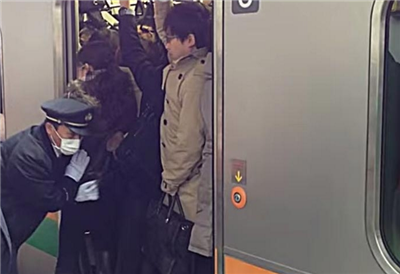5. There are designated people who will push you into a crowded subway car.
有特定的人會把你推進(jìn)擁擠的地鐵里。
Oshiya, or "pushers," wear uniforms, white gloves, and hats and literally push people into crowded subway cars during rush hour.
Oshiya或者是“助推員”,他們穿著制服,白手套還有帽子,如字面的意思會在繁忙時段把人推進(jìn)擁擠的地鐵里。

They are paid to make sure everybody gets in and doesn't get caught in the doors.
他們被請來確保所有人都能上車而不被車門夾到。
6. People will sleep on the trains with their head on your shoulder.
其他人會把頭靠著你的肩膀睡覺。
If someone in Japan falls asleep with his or her head on you shoulder, it is common practice to just tolerate it. People have very long commutes and work dreadfully long hours, so many will often fall asleep on the train.
在日本如果有人把頭靠著你的肩膀睡覺,這是很常見的事情,而你最好學(xué)會忍受它。日本人從工作地點(diǎn)回家要很長的時間,而他們已經(jīng)很累了,在火車上經(jīng)常有人睡著。
"There is a tolerance that if the person next to you falls asleep and their head kind of lands on your shoulder, people just put up with it," Sandra Barron told CNN. "That happens a lot."
“如果有人在你旁邊睡著而且把頭靠在你的肩膀上,大家通常都會忍受這種為。”Sandra Barron告訴CNN。“這經(jīng)常發(fā)生。”











